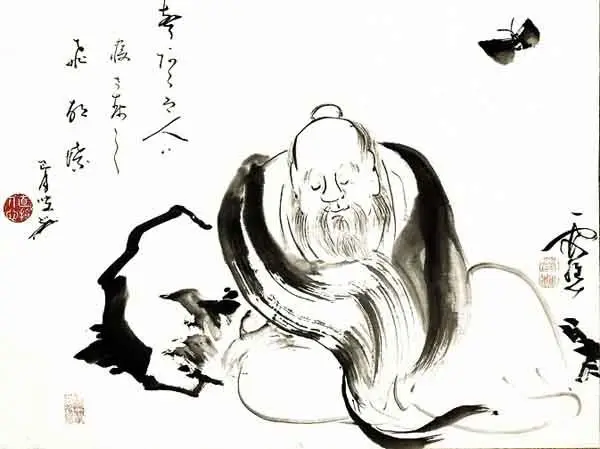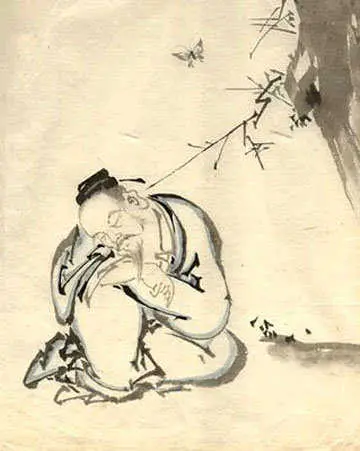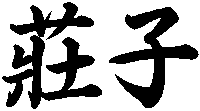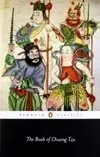|
Tao Te Ching
THE TAOISM OF LAO TZU
|
Chuang Tzu 2 The Taoist Text, Chapter 2
The Adjustment of Controversies.1. Nan-kwo Tsze-khì was seated, leaning forward on his stool. He was looking up to heaven and breathed gently, seeming to be in a trance, and to have lost all consciousness of any companion. (His disciple), Yen Khang Tsze-yû, who was in attendance and standing before him, said, "What is this? Can the body be made to become thus like a withered tree, and the mind to become like slaked lime? His appearance as he leans forward on the stool to-day is such as I never saw him have before in the same position." Tsze-khì said, "Yen, you do well to ask such a question, I had just now lost myself; but how should you understand it? You may have heard the notes of Man, but have not heard those of Earth; you may have heard the notes of Earth, but have not heard those of Heaven."
Tsze-yû said, "I venture to ask from you a description of all these." The reply was, "When the breath of the Great Mass (of nature) comes strongly, it is called Wind. Sometimes it does not come so; but when it does, then from a myriad apertures there issues its excited noise;- have you not heard it in a prolonged gale? Take the projecting bluff of a mountain forest;- in the great trees, a hundred spans round, the apertures and cavities are like the nostrils, or the mouth, or the ears; now square, now round like a cup or a mortar; here like a wet footprint, and there like a large puddle. (The sounds issuing from them are like) those of fretted water, of the arrowy whizz, of the stern command, of the inhaling of the breath, of the shout, of the gruff note, of the deep wail, of the sad and piping note. The first notes are slight, and those that follow deeper, but in harmony with them. Gentle winds produce a small response; violent winds a great one. When the fierce gusts have passed away, all the apertures are empty (and still);- have you not seen this in the bending and quivering of the branches and leaves?" Tsze-yû said, "The notes of Earth then are simply those which come from its myriad apertures; and the notes of Man may just be compared to those which (are brought from the tubes of) bamboo;- allow me to ask about the notes of Heaven." Tsze-khì replied, "When (the wind) blows, (the sounds from) the myriad apertures are different, and (its cessation) makes them stop of themselves. Both of these things arise from (the wind and the apertures) themselves:- should there be any other agency that excites them?"
Joy and anger, sadness and pleasure, anticipation and regret, fickleness and fixedness, vehemence and indolence, eagerness and tardiness;- (all these moods), like music from an empty tube, or mushrooms from the warm moisture, day and night succeed to one another and come before us, and we do not know whence they sprout. Let us stop! Let us stop! Can we expect to find out suddenly how they are produced? If there were not (the views of) another, I should not have mine; if there were not I (with my views), his would be uncalled for:- this is nearly a true statement of the case, but we do not know what it is that makes it be so. It might seem as if there would be a true Governor concerned in it, but we do not find any trace (of his presence and acting). That such an One could act so I believe; but we do not see His form. He has affections, but He has no form. Given the body, with its hundred parts, its nine openings, and its six viscera, all complete in their places, which do I love the most? Do you love them all equally? or do you love some more than others? Is it not the case that they all perform the part of your servants and waiting women? All of them being such, are they not incompetent to rule one another? or do they take it in turns to be now ruler and now servants? There must be a true Ruler (among them) whether by searching you can find out His character or not, there is neither advantaae nor hurt, so far as the truth of His operation is concerned. When once we have received the bodily form complete, its parts do not fail to perform their functions till the end comes. In conflict with things or in harmony with them, they pursue their course to the end, with the speed of a galloping horse which cannot be stopped;- is it not sad? To be constantly toiling all one's lifetime, without seeing the fruit of one's labour, and to be weary and worn out with his labour, without knowing where he is going to:- is it not a deplorable case? Men may say, "But it is not death;" yet of what advantage is this? When the body is decomposed, the mind will be the same along with it:- must not the case be pronounced very deplorable? Is the life of man indeed enveloped in such darkness? Is it I alone to whom it appears so? And does it not appear to be so to other men?
But speech is not like the blowing (of the wind); the speaker has (a meaning in) his words. If, however, what he says, be indeterminate (as from a mind not made up), does he then really speak or not? He thinks that his words are different from the chirpings of fledgelings; but is there any distinction between them or not? But how can the Tâo be so obscured, that there should be "a True" and "a False" in it? How can speech be so obscured that there should be "the Right" and "the Wrong" about them? Where shall the Tâo go to that it will not be found? Where shall speech be found that it will be inappropriate? Tâo becomes obscured through the small comprehension (of the mind), and speech comes to be obscure through the vain-gloriousness (of the speaker). So it is that we have the contentions between the Literati and the Mohists, the one side affirming what the other denies, and vice versa. If we would decide on their several affirmations and denials, no plan is like bringing the (proper) light (of the mind) to bear on them. All subjects may be looked at from (two points of view),- from that and from this. If I look at a thing from another's point of view, I do not see it; only as I know it myself, do I know it. Hence it is said, "That view comes from this; and this view is a consequence of that:"- which is the theory that that view and this- (the opposite views)- produce each the other. Although it be so, there is affirmed now life and now death; now death and now life; now the admissibility of a thing and now its inadmissibility; now its inadmissibility and now its admissibility. (The disputants) now affirm and now deny; now deny and now affirm. Therefore the sagely man does not pursue this method, but views things in the light of (his) Heaven (-ly nature), and hence forms his judgment of what is right. This view is the same as that, and that view is the same as this. But that view involves both a right and a wrong; and this view involves also a right and a wrong:- are there indeed, or are there not the two views, that and this? They have not found their point of correspondency which is called the pivot of the Tâo. As soon as one finds this pivot, he stands in the centre of the ring (of thought), where he can respond without end to the changing views;- without end to those affirming, and without end to those denying. Therefore I said, "There is nothing like the proper light (of the mind)."
It was separation that led to completion; from completion ensued dissolution. But all things, without reoard to their completion and dissolution, may again be comprehended in their unity;- it is only the far reaching in thought who know how to comprehend them in this unity. This being so, let us give up our devotion to our own views, and occupy ourselves with the ordinary views. These ordinary views are grounded on the use of things. (The study of that) use leads to the comprehensive judgment, and that judgment secures the success (of the inquiry). That success gained, we are near (to the object of our search), and there we stop. When we stop, and yet we do not know how it is so, we have what is called the Tâo. When we toil our spirits and intelligence, obstinately determined (to establish our own view), and do not know the agreement (which underlies it and the views of others), we have what is called "In the morning three." What is meant by that "In the morning three?" A keeper of monkeys, in giving them out their acorns, (once) said, "In the morning I will give you three (measures) and in the evening four." This made them all angry, and he said, "Very well. In the morning I will give you four and in the evening three." His two proposals were substantially the same, but the result of the one was to make the creatures angry, and of the other to make them pleased:- an illustration of the point I am insisting on. Therefore the sagely man brings together a dispute in its affirmations and denials, and rests in the equal fashioning of Heaven. Both sides of the question are admissible.
A third class held that there was such recognition, but there had not begun to be any expression of different opinions about it. It was through the definite expression of different opinions about it that there ensued injury to (the doctrine of) the Tìo. It was this injury to the (doctrine of the) Tìo which led to the formation of (partial) preferences. Was it indeed after such preferences were formed that the injury came? or did the injury precede the rise of such preferences? If the injury arose after their formation, Kìo's method of playing on the lute was natural. If the injury arose before their formation, there would have been no such playing on the lute as Kâo's. Kâo Wan's playing on the lute, Shih Kwang's indicating time with his staff, and Hui-tsze's (giving his views), while leaning against a dryandra tree (were all extraordinary). The knowledge of the three men (in their several arts) was nearly perfect, and therefore they practised them to the end of their lives. They loved them because they were different from those of others. They loved them and wished to make them known to others. But as they could not be made clear, though they tried to make them so, they ended with the obscure (discussions) about "the hard" and "the white." And their sons, moreover, with all the threads of their fathers" compositions, yet to the end of their lives accomplished nothing. If they, proceeding in this way, could be said to have succeeded, then am I also successful; if they cannot be pronounced successful, neither I nor any other can succeed. Therefore the scintillations of light from the midst of confusion and perplexity are indeed valued by the sagely man; but not to use one's own views and to take his position on the ordinary views is what is called using the (proper) light.
There was a beginning. There was a beginning before that beginning. There was a beginning previous to that beginning before there was the beginning. There was existence; there had been no existence. There was no existence before the beginning of that no existence. There was no existence previous to the no existence before there was the beginning of the no existence. If suddenly there was nonexistence, we do not know whether it was really anything existing, or really not existing. Now I have said what I have said, but I do not know whether what I have said be really anything to the point or not. Under heaven there is nothing greater than the tip of an autumn down, and the Thâi mountain is small. There is no one more long-lived than a child which dies prematurely, and Phang Tsû did not live out his time. Heaven, Earth, and I were produced together, and all things and I are one. Since they are one, can there be speech about them? But since they are spoken of as one, must there not be room for speech? One and Speech are two; two and one are three. Going on from this (in our enumeration), the most skilful reckoner cannot reach (the end of the necessary numbers), and how much less can ordinary people do so! Therefore from non-existence we proceed to existence till we arrive at three; proceeding from existence to existence, to how many should we reach? Let us abjure such procedure, and simply rest here.
The Great Tâo does not admit of being praised. The Great Argument does not require words. Great Benevolence is not (officiously) benevolent. Great Disinterestedness does not vaunt its humility. Great Courage is not seen in stubborn bravery. The Tâo that is displayed is not the Tâo. Words that are argumentative do not reach the point. Benevolence that is constantly exercised does not accomplish its object. Disinterestedness that vaunts its purity is not genuine. Courage that is most stubborn is ineffectual. These five seem to be round (and complete), but they tend to become square (and immovable). Therefore the knowledge that stops at what it does not know is the greatest. Who knows the argument that needs no words, and the Way that is not to be trodden? He who is able to know this has what is called "The Heavenly Treasure-house." He may pour into it without its being filled; he may pour from it without its being exhausted; and all the while he does not know whence (the supply) comes. This is what is called "The Store of Light." Therefore of old Yâo asked Shun, saying, "I wish to smite (the rulers of) Tsung, Kwei, and Hsü-âo. Even when standing in my court, I cannot get them out of my mind. How is it so?" Shun replied, "Those three rulers live (in their little states) as if they were among the mugwort and other brushwood;- how is it that you cannot get them out of your mind? Formerly, ten suns came out together, and all things were illuminated by them;- how much should (your) virtue exceed (all) suns!"
Nieh Khüeh said (further), "Since you, Sir, do not know what is advantageous and what is hurtful, is the Perfect man also in the same way without the knowledge of them?" Wang Î replied, "The Perfect man is spirit-like. Great lakes might be boiling about him, and he would not feel their heat; the Ho and the Han might be frozen tip, and he would not feel the cold; the hurrying thunderbolts might split the mountains, and the wind shake the ocean, without being able to make him afraid. Being such, he mounts on the clouds of the air, rides on the sun and moon, and rambles at ease beyond the four seas. Neither death nor life makes any change in him, and how much less should the considerations of advantage and injury do so!"
"How could any one stand by the side of the sun and moon, and hold under his arm all space and all time? (Such language only means that the sagely man) keeps his mouth shut, and puts aside questions that are uncertain and dark; making his inferior capacities unite with him in honouring (the One Lord). Men in general bustle about and toil; the sagely man seems stupid and to know nothing. He blends ten thousand years together in the one (conception of time); the myriad things all pursue their spontaneous course, and they are all before him as doing so. "How do I know that the love of life is not a delusion? and that the dislike of death is not like a young person's losing his way, and not knowing that he is (really) going home? Lì Kì was a daughter of the border Warden of Âi. When (the ruler of) the state of Tsin first got possession of her, she wept till the tears wetted all the front of her dress. But when she came to the place of the king, shared with him his luxurious couch, and ate his grain-and-grass-fed meat, then she regretted that she had wept. How do I know that the dead do not repent of their former craving for life? "Those who dream of (the pleasures of) drinking may in the morning wail and weep; those who dream of wailing and weeping may in the morning be going out to hunt. When they were dreaming they did not know it was a dream; in their dream they may even have tried to interpret it; but when they awoke they knew that it was a dream. And there is the great awaking, after which we shall know that this life was a great dream. All the while, the stupid think they are awake, and with nice discrimination insist on their knowledge; now playing the part of rulers, and now of grooms. Bigoted was that Khiû! He and you are both dreaming. I who say that you are dreaming am dreaming myself. These words seem very strange; but if after ten thousand ages we once meet with a great sage who knows how to explain them, it will be as if we met him (unexpectedly) some morning or evening.
"Whom shall I employ to adjudicate in the matter? If I employ one who agrees with you, how can he, agreeing with you, do so correctly? And the same may be said, if I employ one who agrees with me. It will be the same if I employ one who differs from us both or one who agrees with us both. In this way I and you and those others would all not be able to come to a mutual understanding; and shall we then wait for that (great sage)? (We need not do so.) To wait on others to learn how conflicting opinions are changed is simply like not so waiting at all. The harmonising of them is to be found in the invisible operation of Heaven, and by following this on into the unlimited past. It is by this method that we can complete our years (without our minds being disturbed). "What is meant by harmonising (conflicting opinions) in the invisible operation of Heaven? There is the affirmation and the denial of it; and there is the assertion of an opinion and the rejection of it. If the affirmation be according to the reality of the fact, it is certainly different from the denial of it:- there can be no dispute about that. If the assertion of an opinion be correct, it is certainly different from its rejection:- neither can there be any dispute about that. Let us forget the lapse of time; let us forget the conflict of opinions. Let us make our appeal to the Infinite, and take up our position there."
"Formerly, I, Kwang Kâu, dreamt that I was a butterfly, a butterfly flying about, feeling that it was enjoying itself. I did not know that it was Kâu. Suddenly I awoke, and was myself again, the veritable Kâu. I did not know whether it had formerly been Kâu dreaming that he was a butterfly, or it was now a butterfly dreaming that it was Kâu. But between Kâu and a butterfly there must be a difference. This is a case of what is called the Transformation of Things." 
Chuang Tzu
 The Book of Chuang TzuA modern translation of Chuang Tzu, by Martin Palmer and Elizabeth Breuilly.See the book at Amazon
About CookiesMy Other Websites:I Ching OnlineThe 64 hexagrams of the Chinese classic I Ching and what they mean in divination. Try it online for free.
Qi Energy ExercisesThe ancient Chinese life energy qi (chi) explained, with simple instructions on how to exercise it.
Life EnergyThe many ancient and modern life force beliefs all over the world explained and compared.
Taoismen på svenska
Other Books by Stefan StenuddClick the image to see the book at Amazon (paid link).
The Greek philosophers and what they thought about cosmology, myth, and the gods. |
 Tao Te Ching
Tao Te Ching Tao Quotes
Tao Quotes Fake Lao Tzu Quotes
Fake Lao Tzu Quotes Cosmos of the Ancients
Cosmos of the Ancients Qi — Increase Your Life Energy
Qi — Increase Your Life Energy Aikido Principles
Aikido Principles Life Energy Encyclopedia
Life Energy Encyclopedia Archetypes of Mythology
Archetypes of Mythology Psychoanalysis of Mythology
Psychoanalysis of Mythology Stefan Stenudd
Stefan Stenudd